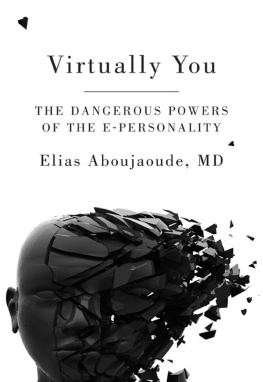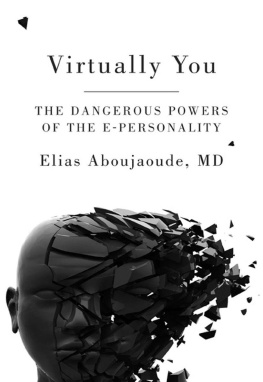Aboujaoude - Virtually You
Here you can read online Aboujaoude - Virtually You full text of the book (entire story) in english for free. Download pdf and epub, get meaning, cover and reviews about this ebook. publisher: W. W. Norton & Company, genre: Politics. Description of the work, (preface) as well as reviews are available. Best literature library LitArk.com created for fans of good reading and offers a wide selection of genres:
Romance novel
Science fiction
Adventure
Detective
Science
History
Home and family
Prose
Art
Politics
Computer
Non-fiction
Religion
Business
Children
Humor
Choose a favorite category and find really read worthwhile books. Enjoy immersion in the world of imagination, feel the emotions of the characters or learn something new for yourself, make an fascinating discovery.
- Book:Virtually You
- Author:
- Publisher:W. W. Norton & Company
- Genre:
- Rating:5 / 5
- Favourites:Add to favourites
- Your mark:
- 100
- 1
- 2
- 3
- 4
- 5
Virtually You: summary, description and annotation
We offer to read an annotation, description, summary or preface (depends on what the author of the book "Virtually You" wrote himself). If you haven't found the necessary information about the book — write in the comments, we will try to find it.
Virtually You — read online for free the complete book (whole text) full work
Below is the text of the book, divided by pages. System saving the place of the last page read, allows you to conveniently read the book "Virtually You" online for free, without having to search again every time where you left off. Put a bookmark, and you can go to the page where you finished reading at any time.
Font size:
Interval:
Bookmark:
Compulsive Acts: A Psychiatrists Tales of Ritual and Obsession
The Dangerous Powers of the E-Personality
W. W. N ORTON & C OMPANY
New York London
Copyright 2011 by Elias Aboujaoude, MD
All rights reserved
Names and identifying details have been changed to protect the privacy of all individuals whose stories appear in this book.
For information about permission to reproduce selections from this book, write to Permissions, W. W. Norton & Company, Inc., 500 Fifth Avenue, New York, NY 10110
Library of Congress Cataloging-in-Publication Data
Aboujaoude, Elias, 1971
Virtually you: the dangerous powers of the e-personality / Elias Aboujaoude.
p. cm.
Includes bibliographical references.
ISBN: 978-0-393-07064-4
1. Internet addiction. 2. InternetPsychological aspects.
3. InternetSocial aspects. 4. Personality disorders. I. Title.
RC569.5.I54A26 2011
616.85'84dc22
2010043483
W. W. Norton & Company, Inc.
500 Fifth Avenue, New York, N.Y. 10110
www.wwnorton.com
W. W. Norton & Company Ltd.
Castle House, 75/76 Wells Street, London W1T 3QT
TO MY MOTHER
M Y PATIENTS , many of whom have obsessive compulsive disorder and as a result are highly superstitious, would probably caution me against starting a book on the Internet with a reference to online death and virtual estate planning. But as I was pondering how to introduce a book on this Internet life, an article that suggested I start preparing for my online afterlife arrived in my in-box. The news story introduced me to two Web sites that apparently any responsible netizen should bookmark: MyLasteMail.com, where I can leave special messages for loved ones to receive after I diean online legacy they can treasure forever, according to the site; and MyWebWill.com, which offers to carry out my last digital wishes, such as forwarding my passwords to designated relatives, deactivating my accounts, making one final Facebook status update and sending one last tweet on my behalf, and even ensuring that my World of Warcraft character finds a new stable home. Metaphysics, rest assured, is for the most part beyond the scope of this book, especially to the extent that the afterlife the article was concerned about is that of our avataran entity that, as we will see, differs in important ways from who the dying person really is. Still, it may be appropriate to bring up MyLasteMail and MyWebWill before Amazon or YouTube, because they suggest how highly evolved and complete our Web experience has become. This evolution, to the point where we are now born online as someone rather different, live abundantly there, then die and have a legacy to worry about, is, I will argue, sometimes happening at the expense of our offline life and evolution, and our overall psychological equilibrium. And this is very much the subject of the book.
Although I had never contemplated the digital hereafter, I have, for a long time, wondered about what it means to go online. As a Stanford medical student during the dot-com years, I was keenly aware of our campuss role as technology incubator for nearby Silicon Valley, and often marveled at the Internets power to attract fellow classmates away from the certainty of medicine and into a career in an unknown new world.
A few years later, as a psychiatrist at the Stanford University School of Medicine, where I am director of the OCD Clinic and the Impulse Control Disorders Clinic, I started seeing the ways in which the Internet facilitates dramatic shifts in identity and behavior. The compulsive nature of some peoples Internet use can be compared to OCD, and the euphoric high some experience is similar to what we see in impulse control disorders such as pathological gambling. For those reasons, it made sense that individuals with Internet-related psychological disturbances would be referred to my practice. My approach to diagnosing and treating them was also informed by research: I helped lead the largest U.S. study on problematic Internet use published to date. The study, which looked at the Internet habits of over 2,500 U.S. adults, revealed alarming rates of online pathological behavior that cut across geographic, socioeconomic, age, and gender differences. The data we collected confirmed what my years of experience as a Silicon Valley resident, student, observer, and psychiatrist have taught me: that while the Internet is a force for good in many arenas, it also has the power to interfere with our home lives, our romantic relationships, our careers, our parenting abilitiesand our very concept of who we are.
The way we see and evaluate ourselves is changing as a function of new personality traits born and nurtured in the virtual world. These include an exaggerated sense of our abilities, a superior attitude toward others, a new moral code that we adopt online, a proneness to impulsive behavior, and a tendency to regress to childlike states when faced with an open browser. Together, these traits combine into a whole new you. However, unlike other experiences that pretend to deliver this transformation but are hardly transformative, the Internet is, indeed, fundamentally changing us. The ways in which we act, interact, speak, read, think, and negotiate urges and goals online are remarkably different from the ways in which we handled these activities offline. What may be more remarkable, however, is that our online traits are unconsciously being imported into our offline life, so that our idea of what a real-life community should be, for example, is being reconfigured in the image of a chat room, and our offline persona increasingly resembles that of our avatar. Even with no browser window in sight, on an island that DSL somehow forgotour ages equivalent of the proverbial deserted islandthe ways in which we would act, interact, speak, read, think, and negotiate urges and goals would all be very different from the ways in which these occurred Before Google.
Because of its ubiquity and deep penetration, the Internet is the main vehicle for this transformation and the main focus here, but other mediums can also transport us into a virtual experience. Video games, smart phones, and iPads all share important features with the Internet, and all illustrate to varying degrees the psychological processes and real-life consequences that are the subject of this book. As such, I will refer to research and anecdotes pertaining to those other digital pastimes in order to make my argument more relevant and, I would hope, more comprehensive. (It has also become impossible to define the boundaries between various information-age appendages, as our iPhone becomes our personal daily planner, our gaming console, and our Internet browser.) It is all one big digital life, or afterlife; the Internet just happens to have been our introduction, a gateway drug, of sorts, that has opened the door wide to other addictions.
There is no doubt that the Internet (and our other digital crutches) has radically and irreversibly changed the way we work, play, see the world, and relate to one another. Yet the very significant and often negative psychological transformations that have ensued have gone largely unexplored. I try, in Virtually You , to look past gross domestic product gains and other uncontroversial, largely positive, things the Internet has brought about to focus, instead, on those. I recognize the good in cyberspace but strive for an assessment of the Internet that is more mindful of our psyche, and try to give the reader the tools and questions necessary to reach such an assessment. I will have succeeded if the reader starts approaching virtual life a little bit more self-consciously, if not necessarily less frequently. I harbor no illusions about the latter.
Font size:
Interval:
Bookmark:
Similar books «Virtually You»
Look at similar books to Virtually You. We have selected literature similar in name and meaning in the hope of providing readers with more options to find new, interesting, not yet read works.
Discussion, reviews of the book Virtually You and just readers' own opinions. Leave your comments, write what you think about the work, its meaning or the main characters. Specify what exactly you liked and what you didn't like, and why you think so.





